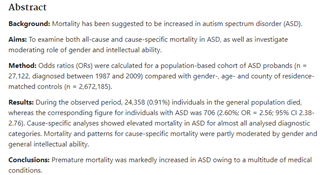To me there still seems to be a gap in the market, with most resources focussing on autistic children and young adults and hardly anything for older people. So it makes a change to see a video on the experience of older autistic people.
We could really due with resources that cover the whole lifespan, I think, including end of life care (my unidentified autistic dad died on a busy, noisy ward (radio 2 blaring constantly, as if this would automatically be helpful to patients) which, even though I wasn't aware of our neurodivergence even just a few years ago, I know would have made him much less comfortable).
Dad enjoyed peace and quiet, or maybe a little Radio 4 and I remember thinking that it was a pity he wouldn't wear earphones (great difficulty putting up with anything around his head or face, including glasses). We all need and deserve much better as we grow older.
www.youtube.com/watch



